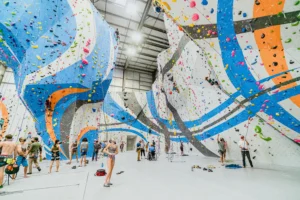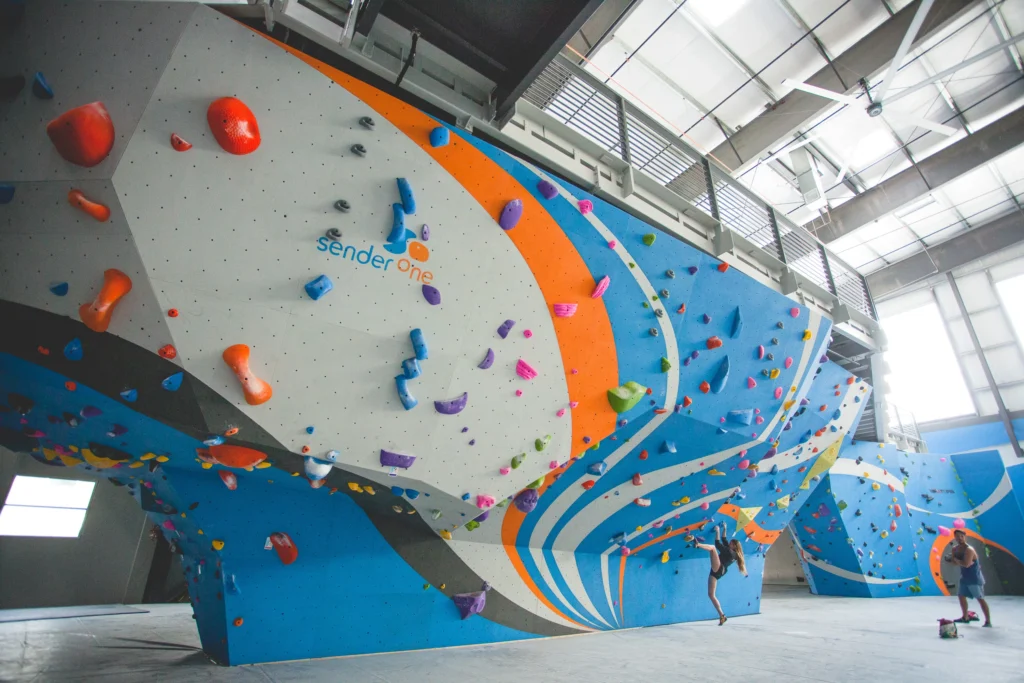
The move comes as climbing gyms reach new heights, with operators from Los Angeles to Houston building bigger, community-focused spaces
Climbing gym company Sender One has taken ownership of its flagship Los Angeles facility at 11220 Hindry Avenue, teaming up with impact investment cooperative Kachuwa Impact Fund in a move that underscores the growing role of community and shared spaces in the fitness industry.
The Southern California climbing gym operator purchased the property housing its LAX location, which opened in 2017, from a family owner who had maintained a decade-long relationship with the brand. The deal, backed by Kachuwa as lead equity investor, locks in a new 15-year lease, cementing Sender One’s role as a hub for the climbing community.
The deal comes as the climbing gym market is projected to grow to $7.72 billion by 2029, according to Technavio, driven by the sport’s Olympic profile and its appeal as both a full-body workout and a social experience.

“Climbing gyms are spaces for transformation—for discovering who you are and connecting with others,” Sender One co-founder and CEO Alice Kao said. “Sender One was founded 13 years ago with support from local community investors—people who believed in our purpose before we had a business plan. With this acquisition, we’re continuing that tradition by partnering with an investor who shares our values and long-term vision. We’re safeguarding a space that means so much to our community—and we’re doing it with a partner who believes that the best way to profit is through serving people and purpose.”
For Colorado-based Kachuwa, the Sender One deal marks its first investment in California. The state leads the nation in commercial climbing gyms, making the LAX facility a valuable asset in a competitive and growing market.
“In addition to supporting mission-driven companies, we’re investing in spaces that actively strengthen communities and BIPOC leadership,” Kachuwa founder and president Blake Jones said. His view echoes what many operators observe, that climbing gyms offer more than a workout, serving as “third spaces” where members find camaraderie and connection in an era of rising social isolation.
The Sender One LAX location, one of five in the climbing brand’s portfolio, features a two-story bouldering area, top rope and lead climbing, yoga and fitness offerings. It holds the title of the tallest rope climbing facility in Southern California, anchored by its 60-foot centerpiece known as The Torch, which boasts 40 degrees of overhanging terrain. Climbers can end a session by watching planes pass overhead from nearby LAX airport from the top-out boulder or unwinding in the sauna.
“Sender One has transformed this property into more than just a solar-powered climbing gym—it’s become a cornerstone of connection and well-being in the LA community,” Kachuwa board director Yichen Feng said. “We’re proud to help secure its future while demonstrating how real estate can be a force for regeneration, not just profit.”

Other players in the climbing gym sector are also expanding in California. In May, Movement Climbing, Yoga and Fitness opened its fifth Bay Area gym in Mountain View, featuring a 24,000-square-foot facility featuring bouldering terrain, a boutique-style yoga studio, full strength and cardio offerings and a community gathering space.
Beyond California, Portland Rock Gym recently completed an expansion that made it the largest climbing facility in the Pacific Northwest. In Texas, Momentum Indoor Climbing is gearing up for a $2.2 million project to add a new 38,000-square-foot location in Houston’s Memorial City area, scheduled to open in 2026.
